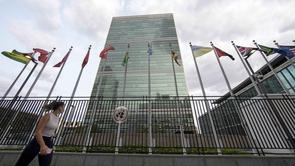 A woman walks past the United Nations headquarters in New York, the United States, Sept 14, 2020. (PHOTO / XINHUA)
A woman walks past the United Nations headquarters in New York, the United States, Sept 14, 2020. (PHOTO / XINHUA)
UNITED NATIONS - The UN General Assembly on Tuesday adopted a political declaration, in which member states committed themselves to ending AIDS by 2030.
According to the declaration, member states committed themselves to reducing annual new HIV infections to under 370,000 and annual AIDS-related deaths to under 250,000 by 2025.
They also pledged that by 2025, 95 percent of people at risk of HIV infection have access to and use appropriate, prioritized, person-centered and effective prevention options.
By 2025, at least 34 million people living with HIV will have access to medicines, treatment and diagnostics, according to the declaration
ALSO READ: Address inequalities to end AIDS by 2030, UN chief says
The UN vowed to end the AIDS epidemic by 2030 by achieving 95 percent diagnosis in all people living with HIV, and ensuring 95 percent of those diagnosed to be on antiretroviral therapy, and 95 percent of those on treatment to be virally suppressed.
By 2025, at least 34 million people living with HIV will have access to medicines, treatment and diagnostics, according to the declaration.
The member states committed themselves to putting gender equality and the human rights of all women and girls at the forefront of efforts to mitigate the risk and impact of HIV.
READ MORE: Peng calls for effort to fight HIV/AIDS, tuberculosis
They will increase and fully fund the HIV and AIDS response by mobilizing finance from all sources, increasing annual HIV investments in low-and middle-income countries to US$29 billion by 2025.
They will ensure global accessibility, availability and affordability of safe, effective and quality-assured medicines, including generics, vaccines, diagnostics and other health technologies.
They are also committed to strengthening and enhancing the use of data, innovation, research and development, and science and technology to accelerate the end of AIDS.


